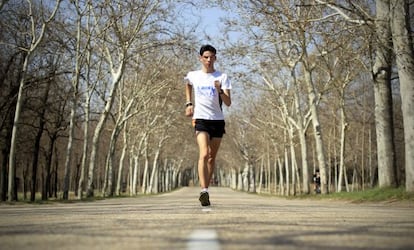The boy walking into history
At 17, Álvaro Martín is on the verge of a place in the Spanish Olympic team

At just 17, Álvaro Martín already has his sights set on a place in the Spanish team at this summer's Olympic Games in London. On March 18, Martín trimmed three minutes off the Spanish junior 20-kilometer race walk, improving his own personal best to clock an incredible 1:22.12 in Lugano, Switzerland. The record had stood since 1988.
He has already achieved entry standard for London, but his place among the three race walkers in the Spanish team will also depend on his performance in the World Race Walking Cup in Russia, in May.
"If I don't earn a place I will be disappointed, but I'll just have to live with it," says Martín, relaxing after his traditional training session in Madrid's Casa de Campo park. "But there will certainly be no excuses at the 2016 Games," he says.
Martín's training sessions involved covering at least one kilometer every four-and-a-half minutes, dodging the dog walkers, retirees, cyclists and four-wheel-drive park-services vehicles as he follows the pace set by Spanish champion Julia Takacs.
His teammates complain about their punishing schedule, but Martín seems inured to the routine. He has already covered two kilometers walking from the Blume High Performance Center where he has been living for the last two years thanks to a grant.
Already competing at the highest levels, Martín has clear ideas about the problems facing Spanish sport. He says that he was "extremely sad" when he read about race walker Paquillo Fernández's ban for doping. But he also understands the pressure that athletes are under, and put themselves under. "But I would never take a banned substance: if you're not up to the challenge, the only thing to do is stop competing. It is a tragedy to see how so many of my generation are already destroyed by drugs."
Martín says he thrives on the effort that his training involves, and that he is "humbled" by the possibilities that await him, having spent his life since the age of nine training as a long distance runner.
At age 13 he was Spain's second-fastest 3,000-meter runner, but had to give up long-distance running after suffering knee injuries.
His day is simple, if grueling. After breakfast he spends two hours studying for university, then three hours training, followed by another two hours in class. "The tougher the training session, the more my head hurts and the more difficult I find it to study," he says. He is in bed every night by 11pm.
Before beginning his third of five two-kilometer training sessions, he sweeps his hair back and sets a borrowed stop watch in motion — he lost his during the race in Switzerland, and had no idea of his achievement until he crossed the finishing line, promptly bursting into tears when he was told.
By now it is time to be getting back to Blume, so instead of returning on foot as usual, his coach takes him by car. A teammate jokingly reminds him to remember them when he is rich and famous. "I'm poor, and I guess I always will be," he replies with a chuckle.
Tu suscripción se está usando en otro dispositivo
¿Quieres añadir otro usuario a tu suscripción?
Si continúas leyendo en este dispositivo, no se podrá leer en el otro.
FlechaTu suscripción se está usando en otro dispositivo y solo puedes acceder a EL PAÍS desde un dispositivo a la vez.
Si quieres compartir tu cuenta, cambia tu suscripción a la modalidad Premium, así podrás añadir otro usuario. Cada uno accederá con su propia cuenta de email, lo que os permitirá personalizar vuestra experiencia en EL PAÍS.
¿Tienes una suscripción de empresa? Accede aquí para contratar más cuentas.
En el caso de no saber quién está usando tu cuenta, te recomendamos cambiar tu contraseña aquí.
Si decides continuar compartiendo tu cuenta, este mensaje se mostrará en tu dispositivo y en el de la otra persona que está usando tu cuenta de forma indefinida, afectando a tu experiencia de lectura. Puedes consultar aquí los términos y condiciones de la suscripción digital.









































